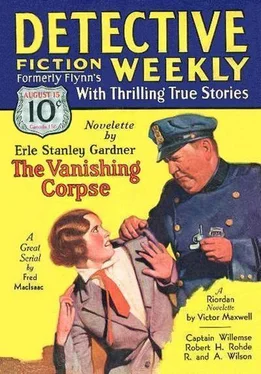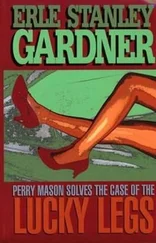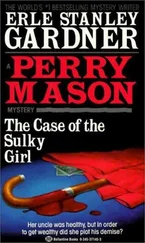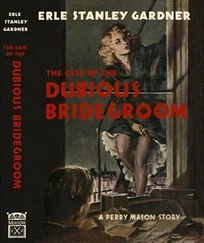Эрл Гарднер - The Vanishing Corpse
Здесь есть возможность читать онлайн «Эрл Гарднер - The Vanishing Corpse» весь текст электронной книги совершенно бесплатно (целиком полную версию без сокращений). В некоторых случаях можно слушать аудио, скачать через торрент в формате fb2 и присутствует краткое содержание. Год выпуска: 1931, Жанр: Классический детектив, на английском языке. Описание произведения, (предисловие) а так же отзывы посетителей доступны на портале библиотеки ЛибКат.
- Название:The Vanishing Corpse
- Автор:
- Жанр:
- Год:1931
- ISBN:нет данных
- Рейтинг книги:4 / 5. Голосов: 1
-
Избранное:Добавить в избранное
- Отзывы:
-
Ваша оценка:
- 80
- 1
- 2
- 3
- 4
- 5
The Vanishing Corpse: краткое содержание, описание и аннотация
Предлагаем к чтению аннотацию, описание, краткое содержание или предисловие (зависит от того, что написал сам автор книги «The Vanishing Corpse»). Если вы не нашли необходимую информацию о книге — напишите в комментариях, мы постараемся отыскать её.
The Vanishing Corpse — читать онлайн бесплатно полную книгу (весь текст) целиком
Ниже представлен текст книги, разбитый по страницам. Система сохранения места последней прочитанной страницы, позволяет с удобством читать онлайн бесплатно книгу «The Vanishing Corpse», без необходимости каждый раз заново искать на чём Вы остановились. Поставьте закладку, и сможете в любой момент перейти на страницу, на которой закончили чтение.
Интервал:
Закладка:
Officer O’Hara put out his big hands, patting the garments of the girl with a practiced hand. She winced at his first touch, then stood still. Nor did she move when the officer gave an explanation and plunged his hand into the inside pocket of the coat. He brought out a pearl-handled revolver, short-barreled, nickeled.
He broke it open.
The brass shells showed as dull circles of coppery color, and two of those shells showed the mark of a firing pin. The other four were unfired.
Officer O’Hara smelled the muzzle of the gun.
“Shot recently — within an hour,” he said, and glared accusingly at the girl.
“This,” he added, almost regretfully, “is serious.”
The girl said nothing.
He snapped one of the handcuffs around her unresisting right wrist, led her back to the wharf from which she had rushed. His flashlight sent a white beam darting among piled boxes, odds and ends of junk, out into the darkness where the bay swallowed the beam of light.
Sidney Zoom scorned such a laborious method of search. He caught the eye of the police dog.
“Find, Rip,” he said.
The dog darted on ahead, nose to the rough timbers, giving an audible sniffing as he ran in questing circles. He picked up the trail, followed it, getting off to one side from time to time, only to swing back.
The girl hung back until the steel bit into her wrist.
Officer O’Hara raised his flashlight. The dog gave a single swift bark, then remained poised, forepaws spread apart, eyes glittering greenly in the light that was reflected from the flashlight.
Between those forepaws was a little black object, a hand purse of metal mesh, lacquered black.
Officer O’Hara stooped and reached.
The dog’s fangs glittered in the light as he made a snapping charge. Zoom snapped a command. The dog drew back, wagged his tail and sat down.
O’Hara picked up the bag.
“This yours?” he asked the girl.
She made no answer.
The officer opened the bag. He handed his flashlight to Sidney Zoom, who played the light beam upon the interior of the bag.
There was a powder puff, a handkerchief, a metal-cased lipstick, and a pasteboard cartridge box upon which was a green label bearing the name of a well-known manufacturer of ammunition.
The officer took the box from the purse. It was heavy. He shook it, then pulled back the cover.
It was about half filled with cartridges. The rest was wadded with cotton. The officer pulled back that cotton, then gasped. His sucked-in breath was an exclamation. His eyes bulged with sheer surprise.
For the beam of the flashlight seemed to have been magnified a thousandfold and then split up into coruscating beams of purple-white fire that darted about like some imprisoned display of northern lights.
“A diamond!” he exclaimed.
The stone was white, polished, filled with cold fire, and it was so large that it might well have caused the officer to exclaim.
He turned accusingly to the girl.
She shrugged her shoulders.
“The Diamond of Death,” she said, casually, as one might mention the title of a book, and then she became silent once more.
Special Detective Sam Frankly arrived on the scene within fifteen minutes of the time Officer O’Hara placed a call from the police box. He inspected the wharf, the purse, the diamond and the prisoner.
Zoom’s story was simple. He had seen the figure jump from the dark shadows and throw something in the direction of the water. That something had thudded to the planks of the wharf floor. Then the figure had sprinted past him.
Knowing that Officer O’Hara was coming along the street, and thinking the running figure would plump directly into his arms, Sidney Zoom had not given chase at first, nor had he released his police dog. It was only when he saw that the runner had turned the other way, that O’Hara was getting ready to shoot, that he had allowed the dog to sprint and capture the fugitive. Then Zoom had run swiftly after the dog to be where he could control him. During all of that time he had thought the fugitive was a man.
The detective listened with scowling perplexity.
The girl would say absolutely nothing. She had apparently tried to throw the purse with the cartridge box and the diamond into the black waters of the bay. There it would have splashed from sight and never been recovered. She had failed by a matter of inches. The black mesh bag had been within a foot and a half of the water when the dog had found it.
The girl refused to give her name, her address, or to account for her presence. Detective Frankly put her into his car and took her to headquarters. He was closely followed by Sidney Zoom, who was on terms of intimacy with most of the police department heads.
An examination by the matron revealed that the girl had retained her feminine underwear under her masculine disguise. The underwear had been tailored. Police had ascertained the name of the maker by a sewed-in label, had routed him out of bed and learned that the girl was probably Miss Mildred Kroom, a niece of Harrison Stanwood, who was an eccentric collector, residing in the exclusive district in the west end.
Since this was kept from the girl, she felt certain that her incognito had been maintained, and she still kept her silence.
Zoom had solved several mysteries for the police. He was friendly with the executive heads, and he knew just how far a civilian could, and could not, go in connection with police activities.
Hence Lieutenant Sylvester decided to ride out to Stanwood’s house with Zoom in Zoom’s car and let the squad of detectives go in the police car.
They arrived at about the same time.
The men were taking no chances. Two of them darted through the shadows to the back of the house before the other two detectives thumped up on the front porch and pressed the bell button.
The interior of the house jangled with the summons of the bell for many minutes before there was an answering stir of sound from an upper floor. Then they heard the shuffle of slippered feet on the stairs, and a Japanese servant attired in silken bathrobe and with sleep-swollen eyes demanded to know who was ringing the bell.
Satisfied that it was the police, he opened the door and the men walked into a reception hall and through it into a library.
Lieutenant Sylvester took charge of the questioning.
“Mildred Kroom lives here?”
“Yes-s-s-s,” said the Japanese.
“Tell her we want to talk with her.”
“She is-s-s asleep.”
“All right. We’ll go up. Show us her room.”
The servant hesitated for a fraction of a second, then shrugged his shoulders. He went up the stairs. Two of the men followed him.
There could be heard the sound of a muffled knocking, twice repeated, then the rattle of a doorknob. Voices rumbled in conversation. Then there were feet on the stairs once more, followed by a shuffle of slippers and a voice that hysterically rattled excited comment.
The detectives came into the room.
With them was a man in bathrobe and pajamas whose tousled hair gave him a look of wild excitement. He did not need to be questioned. Words flowed from his lips with the explosive rapidity of bullets from a machine gun.
During the few seconds that sufficed for him to enter the library and be seated, Sidney Zoom was able to get a more or less complete history of the man.
His name was Charles Wetler. He was a secretary to Harrison Stanwood. He said the girl, Mildred Kroom, a niece, rather an erratic, impulsive girl who had been expelled from college, had come to assist her uncle in research work and had been the cause of considerable anxiety. She had speculated on the stock market and lost heavily. Yet she was the only kin of Harrison Stanwood, and he was fond of her.
Читать дальшеИнтервал:
Закладка:
Похожие книги на «The Vanishing Corpse»
Представляем Вашему вниманию похожие книги на «The Vanishing Corpse» списком для выбора. Мы отобрали схожую по названию и смыслу литературу в надежде предоставить читателям больше вариантов отыскать новые, интересные, ещё непрочитанные произведения.
Обсуждение, отзывы о книге «The Vanishing Corpse» и просто собственные мнения читателей. Оставьте ваши комментарии, напишите, что Вы думаете о произведении, его смысле или главных героях. Укажите что конкретно понравилось, а что нет, и почему Вы так считаете.












